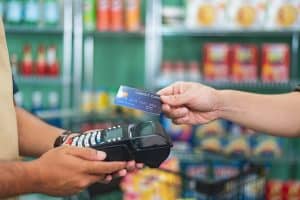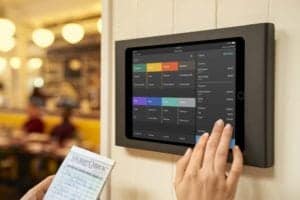Learn the differences between a POS system versus a cash register and how to determine which is better for your small business.
Our content reflects the editorial opinions of our experts. While our site makes money through
referral partnerships, we only partner with companies that meet our standards for quality, as outlined in our independent
rating and scoring system.
Choosing the right way to ring up sales can be tricky — especially when you’re weighing the cost of a modern POS system against a traditional cash register.
In this guide, we’ll break down the key differences between POS systems and cash registers, so you can decide which option makes the most sense for your small business.
POS VS Cash Register: The Key Differences
Here’s a quick look at how traditional cash registers compare to modern POS systems.
| Category |
Cash Register |
POS System |
| Pricing |
One-time purchase, usually $100–$1,500+. No monthly fees. |
Software starts around $0/month; advanced plans up to $100+. Hardware costs range from free readers to $1,000+ setups. |
| Payment Methods |
Accepts cash only. Separate hardware required for cards. |
Accepts cash, credit/debit cards, and contactless payments like Apple Pay |
| Reporting & Analytics |
Limited daily sales totals |
Advanced sales, employee, and inventory reports |
| Features |
Basic payment collection only |
Includes inventory tracking, employee management, loyalty programs, and more |
| Integrations |
No integrations |
Syncs with tools like accounting, payroll, and eCommerce |
| Ease of Use |
Simple, minimal training required. |
Slightly more complex but often includes built-in tutorials and customer support |
A cash register may be a good fit for a small, cash-only business that just needs to record payments quickly and affordably.
A POS system is ideal if you want to accept multiple payment types, track sales data, and manage customers or inventory. The added functionality often justifies the higher upfront or monthly cost.
Mobility & Flexibility
Cash registers are stationary by design — they stay in one spot at your counter. Modern POS systems, however, are built for mobility. Many run on tablets, smartphones, or portable terminals, letting you check out customers anywhere in your store or on the go.
To learn more about mobile checkout options, check out our guide to mPOS systems and software.
When To Choose A POS System
A POS system is best for businesses that want to track performance, manage inventory, and accept multiple payment types.
Choose a POS system if you:
- Need detailed reports on sales, inventory, and employees
- Manage multiple terminals or store locations
- Want features like marketing, loyalty programs, or online sales
- Plan to scale your business in the future
POS Key Features
Modern POS systems include tools for:
- Inventory tracking and automated restocking
- Employee time and performance tracking
- Advanced sales reports and analytics
- Loyalty, gift card, and marketing programs
Once you’ve decided which features matter most, pricing will depend on your setup and business size
POS Pricing
Many small businesses can start with free POS software (like Square) and upgrade later. Expect to pay more as you add tools such as customer displays, barcode scanners, or kitchen display systems. To save money, look for bundled hardware deals or providers that offer financing.
Avoid long-term contracts until you’ve tested the software with a free trial or month-to-month plan.
Pros Of Using A POS
- All-in-one solution
- Numerous features, integrations, and business tools
- Advanced reporting and analytics
- Scalable for growth and multiple locations
Cons Of Using A POS
- May be expensive for small businesses
- May have ongoing fees for features and hardware
- Learning curve for new users
When To Choose A Cash Register
A cash register is best for small or cash-only businesses that just need quick, simple checkouts. Choose a cash register if you:
Cash Register Key Features
Cash registers handle essential checkout functions and can include:
- Cash drawer and receipt printer
- Basic calculator-style interface
- Optional barcode scanner or card reader
Cash Register Pricing
A basic cash register starts at around $100 – $300.
More advanced touchscreen models can cost up to $1,500, but still lack software-based tools like analytics or inventory management.
Pros Of Using A Cash Register
- Affordable and simple
- No subscriptions or extra fees
- Minimal training required
Cons Of Using A Cash Register
- Limited functionality
- No syncing between locations
- No advanced reports or marketing tools
POS Cash Register Combinations
Sometimes, the best setup isn’t one or the other — it’s both.
Many modern POS providers offer POS–cash register combinations that blend the traditional drawer-and-receipt setup with today’s software features.
At a minimum, these bundles usually include a cash drawer, tablet or touchscreen display, and receipt printer — giving you the familiar feel of a cash register with the flexibility of POS software.
Here are a few examples:
| Provider |
Hardware Kit |
What’s Included |
| Square |
Square Register Kit |
Square Register, cash drawer, receipt printer, and starter paper roll |
| Clover |
Station Solo Kit |
14″ touchscreen, cash drawer, and receipt printer |
| Lightspeed Retail |
iPad or Desktop Hardware Kit |
iPad stand, Bluetooth or USB scanner, receipt printer, and cash drawer |
These hybrid systems give you the durability and simplicity of a traditional register with all the advantages of a modern POS — like detailed reporting, inventory tracking, and digital payments.
For help deciding what hardware you actually need (and what you can skip), check out our complete guide to POS hardware.
POS VS Cash Register: Final Thoughts
If your business primarily accepts cash payments, carries limited inventory, or has a small budget, a cash register can still get the job done. It’s simple, affordable, and easy to use.
However, if you want to track both cash and card payments, view detailed reports, or manage customers and inventory in one place, a POS system is the better long-term investment.
Yes, a POS system comes with higher upfront or monthly costs, but the added functionality and efficiency often pay for themselves over time. And with plenty of affordable or even free POS options available, you don’t have to sacrifice features to stay within budget.











